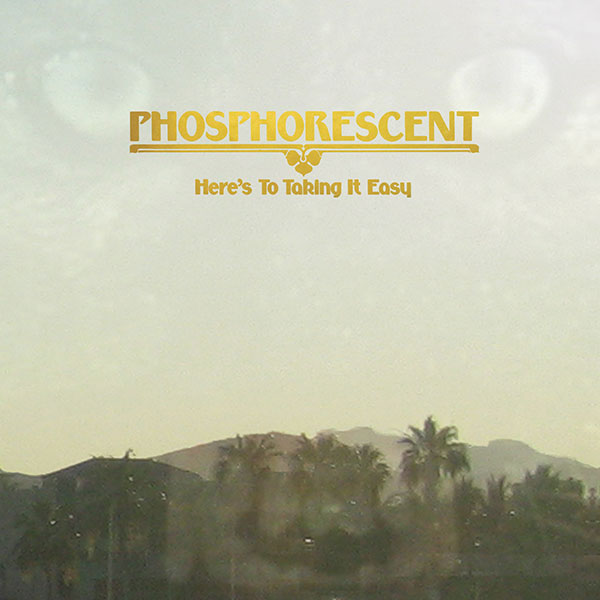Matthew Houck’s got the kind of voice that can’t be seamlessly woven into just any type of song. It’s brittle and quivering, nasally and reedy, carrying Houck’s time spent in Georgia with it in his slight southern accent. It’s a voice that works best with music that aspires to be timeless, worn, and above all American. Even more, while his vocal range is limited – and thus limiting for Houck as a songwriter – it nevertheless provides his work with the sheen of authenticity. And in an era in which pop/rock’s tradition of influence aping and blending has increasingly transformed the contemporary scene into something perilously close to an mélange of pastiche, such authenticity can make all the difference.
That’s my best guess, at least, as to why his new release, continuing under the name, Phosphorescent, he’s used since 2003, manages to be such a remarkable triumph. Because nothing on Here’s To Taking It Easy, his latest release – and one of the year’s very best – could really be called new or unique. Opener “It’s Hard to be Humble (When You’re from Alabama),” whose title may or may not be a nod to Springsteen’s “It’s Hard to be a Saint in the City,” is a classic rock ‘n’ roll blues burner and features a prominent horn arrangement that sounds more than a bit like something from Dylan’s Street Legal. Similarly, the album’s majestic final track, “Los Angeles,” sounds exactly like the music Neil Young was making circa Zuma. And while on both these songs – and throughout the record – Houck makes his own imprint by slathering on the gorgeous, choir-like background harmonies that have become in a way his musical calling-card, even this move could easily be likened to another touchstone classic rock song; go back and listen to “The Only Living Boy in New York,” and try to tell me otherwise.
Of course, I’d be remiss going on about Houck’s influences as I am here without mentioning that his previous release to this one was last year’s To Willie, a wonderful cover record of some of Willie Nelson’s best work. Indeed, understanding how Houck was able to transition from 2007’s sparse, harrowing and acoustic Pride to Here’s To Taking It Easy’s lush and wide-open musicality can’t be done unless To Willie is taken into account. While the records are musically quite similar – both feature fuller bands than Houck had previously used before, with a special emphasis on lilting pedal-steel guitar – the influence is most apparent regarding the persona Houck tries to transmit as a singer. Prior to To Willie, he was more of your typically atypical tortured indie weirdo; following it, he’s become much more of a weathered roamer of the southwest’s badlands, making music that would be most at home in some raggedy saloon on a dry, hot summer’s day.
But he hasn’t shed one archetype for another so much as he’s integrated the two. In this regard, Here’s To Taking It Easy’s album cover is rather instructive. The dominant image is a palatial view of Los Angeles palm trees and a vast, open sky. But superimposed overtop is something quite more sinister – I can’t quite tell what it is, but it’s clearly got two mean-looking eyes and a whole bunch of sharp teeth. That’s not to say that this is a hidden predator of a record – barring the strangely hypnotizing “Hej, Me I’m Light,” everything here could easily be played for a summer BBQ; the music is always gentle and light. But just underneath the surface of the rousing chorus of “The Mermaid Parade,” or the simply beautiful harmonies of “Nothing Was Stolen (Love Me Foolishly)” are unsettling feelings of inadequacy and self-loathing.
Perhaps Houck puts it best himself on the jaunty “Heaven, Sittin’ Down,” singing, “I wish those nights of pleasure and those days of pain weren’t so tightly bound.” It’s a well-worn sentiment in country-rock, the kind of thing Willie Nelson or Townes Van Zandt sang a hundred times in a hundred different ways. But filtered through Phosphorescent’s dreamlike music, and sung through Houck’s distinctly strange voice, it’s almost revelatory.

